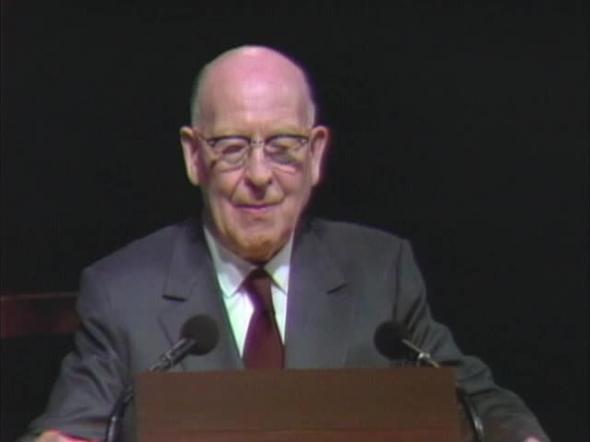
Brother LeGrand Richards issued this apologetic:
I just cannot understand how they could read the Bible and yet not believe, and how marriages could be performed in the churches all over the world until death do you part. What a flimsy concept! Why don’t they go back to the time when God had finished the creation of this earth, and looked upon it and found it good, and placed Adam here, at which time he said: “It is not good that the man should be alone. …” (Gen. 2:18.) He made a helpmeet for him, saying, “… and they shall be one flesh.” (Gen. 2:24.) Now what God joins together and makes one flesh, you couldn’t separate without having two halves instead of two wholes. Jesus repeated that statement when he said:
“For this cause shall a man leave father and mother, and shall cleave to his wife: and they twain shall be one flesh?
“… what therefore God hath joined together, let not man put asunder.” (Matt. 19:5–6.)
I was embarrassed to read it. How crude, I thought. That’s the worst kind of apologetic. But giving the apostles their due, I gave it more thought. I discovered that it is the best kind of apologetic, the kind that is crude on the surface but that holds true all the way down.
God is eternal. We know this from the scriptures and from reason but most of all from our own experience. When we experience divinity, we experience something that transcends time and cannot be worn down. What God has ordained shares in His nature. This means that specific marriages that God has sealed are marriages forever. But it also means that the institution of marriage, which God ordained, is forever. Whether any single marriage is a fit enough vessel of grace to go the distance is a question. Whether marriage in general can go the distance will not–it is a divine institution, not a merely mortal one. Christ’s words mean that individual men should not break up marriages, but also that marriage is not of man, and therefore is not defeated by death. Christ is God, and the joining participates in his victory over the grave.
The eternity of marriage is also part of his nature. “They shall be on flesh” is not just a description. It is a reality. The family is a natural unit. Men and women want and need to be together. Love wants to be forever. The desire for eternity is part of the internal nature of romantic love.
It may seem strange that something that outlasts the universe would depend on the choices two young kids make with the help of other kids (their parents and their community). But that is the nature of the mortal experience. God has put a limit on time precisely so that our choices will be significant. It must be so. It is beautifully so.
Mortality is our foundation for forever. Mortal marriage most of all.
Today I thought I would like to say a few words about the kind of a foundation we have for our faith, and what we live for, and what our aims and our ambitions really are. I think of the time the beautiful temple here on this block was erected, over a hundred years ago. When the foundation was being laid, we are told that it was sixteen feet wide, and at one time President Brigham Young came and saw the workmen throwing in chipped granite. He made them take it out and put in those great granite blocks with this explanation: “We are building this temple to stand through the millennium.” Isn’t that a good thought? Each one of us ought to want to build our lives and help our families to build their lives so that we can stand through the millennium.
-Elder Richards
Other Posts from the Saturday Afternoon Session of the October 1971 General Conference
Continue reading at the original source →



